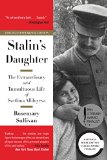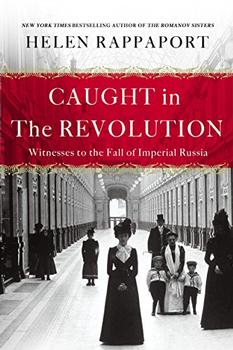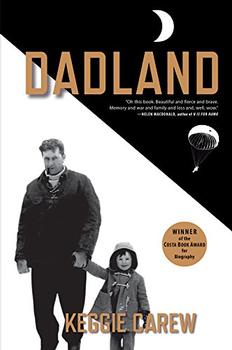Summary | Excerpt | Reviews | Beyond the book | Read-Alikes | Genres & Themes | Author Bio

Critics' Opinion:
Readers' Opinion:
First Published:
Jun 2015, 752 pages
Paperback:
Jun 2016, 768 pages
 Book Reviewed by:
Book Reviewed by:
Sinéad Fitzgibbon
Buy This Book
"There is something fatal about my life. You can't regret your fate, though I do regret my mother didn't marry a carpenter." These words, both poignant and devastating in their simplicity, were spoken by Svetlana Alliluyeva in 1990, during a rare interview with a British journalist. The father to whom she alludes was Joseph Stalin, leader of the Soviet Union from 1922 until his death in 1953, during which time he morphed into a brutal and murderous dictator, responsible for the deaths of millions of Soviet citizens including many from Alliluyeva's own family. Given this blighted and unenviable inheritance, the life of Stalin's only daughter was never going to be ordinary. But as we discover over the course of Rosemary Sullivan's penetrating biography, the true extent of the extraordinariness of her life story is as fascinating and revelatory as it is unexpected.
Svetlana spent much of her adult life on the run. By her own admission "many years had to go by before everything that had taken place…could range itself in my consciousness with my father's name, before I could realize that all of it had been done by him." Once that realization finally dawned, Svetlana could never be at peace. Her surprise defection to the United States in 1967 was just one episode in a lifelong quest to outrun her father's legacy, as was her decision, ten years earlier, to change her surname from Stalina to the matronymic Alliluyeva — her mother's name was Nadezhda (Nadya) Alliluyeva. But try as she might this was a quest which was doomed to fail – her struggles to escape the long and obliterating shadow of her tyrant father would ultimately be in vain. "Svetlana's tragedy," writes Sullivan, was that "everyone reflected back to her the fact that she was Stalin's daughter – they couldn't help themselves."
Sullivan's book, too, is a reflection of the father. Much like Svetlana could never quite escape the long and obliterating shadow cast by Stalin, neither can the author ignore the looming spectre of the Red Tzar. The early part of this book, in particular, is as much Stalin's story as it is a biography of his disconcertingly look-alike daughter. How could it be otherwise? Alliluyeva's unique position meant that, through her books and letters, she could provide posterity with unparalleled insight into the mind of one of history's most feared absolute leaders. Through her eyes, we see not only a ruthless, power-hungry and increasingly paranoid dictator, but also a father who was capable of displaying uncharacteristic fondness, and even affection, for his only daughter – although this would change as Svetlana grew older and failed to rein in her rebellious nature. As Sullivan makes clear, though, even their early relationship had its dark side which saw Stalin engage in his trademark psychological manipulation. His affection for Svetlana was inconstant, he would withdraw it just as easily as he would bestow it, becoming cold and emotionally distant. Indeed, even Khrushchev (Stalin's successor and someone not usually given to sentimentality or empathy) said that the affection bestowed by the father on the daughter was "the tenderness of a cat for a mouse." Little wonder that Svetlana would later admit: "All my life I was used to idealize and romanticize a man I loved, and it always took me a long and painful time to be able to see a man as he really is." Freud would have had a field day.
Throughout this fascinating book, Sullivan paints an intriguing portrait of a woman lost in a sea of fear and confusion. The Svetlana we meet in the pages of this balanced and intuitive biography is a complex, mercurial woman, someone who was as much a victim of her own capriciousness as she was a victim of circumstances. Even after arriving in the United States, she was constantly on the move, buying and selling homes on a whim. Reckless in romantic relationships, she chalked up four divorces over the course of her lifetime (she changed her name to Lana Peters after a brief marriage to American William Wesley Peters, a professional architect, who was once apprentice to Frank Lloyd Wright). In Sullivan's words, Svetlana never found "a safe place to land." Having grown up in a Communist regime, she struggled to survive in a capitalist economy. Never grasping the concept of money, she lost or gave away the millions she earned from her books, ending up poverty-stricken and dependent on the charity of friends. Wilfully abandoning her two eldest children when she defected, she failed to grasp the extent of the psychological and emotional damage she inflicted on them (both children would become alcoholics). Svetlana was someone to be pitied as much as admired, someone who was as kind and generous as she was selfish, controlling, and unforgiving. By liberally quoting from Svetlana's voluminous correspondence, we discover a woman capable of great empathy, but also one whose capacity for self-absorption borders on the narcissistic. This, coupled with her tendency towards unrestrained paranoia, is uncomfortably reminiscent of her father.
For all her self-obsession, however, Svetlana actively resisted the role of martyr. "I may have a cross to bear," she once wrote, "but I am not suffering." On that point, if this biography is anything to judge by, the reader may beg to disagree. Svetlana's life may well have been extraordinary and tumultuous, but it was also almost unbearably tragic. She "survived" it in the broadest sense of the word, but in many ways, her father stole the life of his own daughter, just as he did with the millions of others he so cavalierly disposed of during his blood-soaked reign of terror. As Svetlana herself said: "You are Stalin's daughter. Actually you are already dead. Your life is already finished. You can't live your own life. You can't live any life. You exist only in reference to a name."
Additional Information
A beautiful photo essay in TIME about Svetlana Alliluyeva, later known as Lana Peters, is worth checking out.
![]() This review was originally published in The BookBrowse Review in July 2015, and has been updated for the
July 2016 edition.
Click here to go to this issue.
This review was originally published in The BookBrowse Review in July 2015, and has been updated for the
July 2016 edition.
Click here to go to this issue.

If you liked Stalin's Daughter, try these:

by Helen Rappaport
Published 2018
From the bestselling author of The Romanov Sisters, Caught in the Revolution is Helen Rappaport's masterful telling of the outbreak of the Russian Revolution through eye-witness accounts left by foreign nationals who saw the drama unfold.

by Keggie Carew
Published 2018
A spellbinding journey into surprising and shady corners of twentieth-century politics, a rackety English childhood, the poignant breakdown of a family, the corridors of dementia and beyond.




It is among the commonplaces of education that we often first cut off the living root and then try to replace its ...
Click Here to find out who said this, as well as discovering other famous literary quotes!
Your guide toexceptional books
BookBrowse seeks out and recommends the best in contemporary fiction and nonfiction—books that not only engage and entertain but also deepen our understanding of ourselves and the world around us.